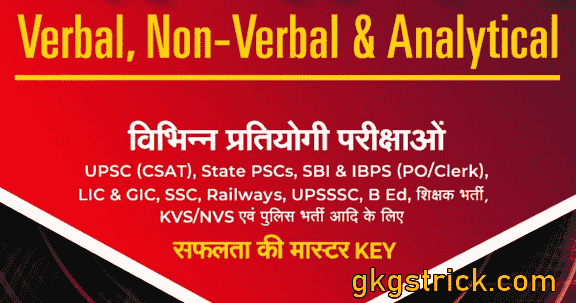SSC Reasoning Syllabus, SSC Reasoning refers to the reasoning section of the Staff Selection Commission (SSC) exams, which are competitive exams conducted by the Government of India to recruit staff for various government departments and organizations. The reasoning section is a crucial part of the SSC exams, and it assesses a candidate’s ability to analyze and solve problems logically.
SSC Reasoning Syllabus
The SSC reasoning section typically consists of questions related to verbal and non-verbal reasoning, logical reasoning, analytical reasoning, and critical thinking. The questions may be in the form of puzzles, syllogisms, analogies, coding-decoding, series, and other similar topics.
To prepare for the SSC reasoning section, it is important to practice regularly and develop strong analytical skills. Candidates can also refer to various study materials and online resources, as well as solve previous years’ question papers to get a better idea of the exam pattern and types of questions asked.
It is also essential to manage time effectively during the exam and attempt the questions in a systematic and organized manner. With the right preparation and practice, one can perform well in the SSC reasoning section and increase their chances of success in the SSC exams.
General Intelligence and Reasoning For SSC Exams
The reasoning section of the SSC (Staff Selection Commission) exam measures a candidate’s ability to think logically and solve problems. The reasoning section consists of both verbal and non-verbal reasoning questions. The topics that are generally covered in the SSC reasoning syllabus are:
- Analogy
- Classification
- Series
- Coding-Decoding
- Blood Relations
- Direction Sense Test
- Logical Venn Diagrams
- Alphabet Test
- Ranking and Time Sequence Test
- Mathematical Operations
- Coded Inequalities
- Syllogism
- Cube and Dice
- Mirror and Water Images
- Embedded Figures
- Paper Folding and Cutting
- Figure Formation and Analysis
- Input-Output
- Statement and Conclusion
- Non-Verbal Series
- Assertion and Reason
- Statement and Assumptions
- Statement and Arguments
- Cause and Effect Reasoning
- Critical Reasoning
It’s important to note that the actual SSC reasoning syllabus may vary slightly from year to year, so candidates are advised to refer to the official notification for the latest updates.
SSC Reasoning Number of Questions :-
Here are some additional details about the reasoning section of the ssc gd reasoning syllabus, ssc mts reasoning syllabus, ssc cgl reasoning syllabus, ssc chsl reasoning syllabus, ssc je reasoning syllabus, ssc cpo reasoning syllabus :
- The reasoning section of the SSC exam typically consists of 25-50 questions, with each question carrying 1-2 marks.
- The difficulty level of the reasoning section can vary from easy to moderate, depending on the specific exam.
- To excel in the reasoning section, candidates should practice regularly and focus on building their logical and analytical skills.
- Candidates can use various resources to prepare for the reasoning section, including online study materials, books, and practice papers.
- It’s important to manage time effectively during the exam and attempt the easier questions first, as this can help boost confidence and overall score.
- Finally, candidates should remain calm and composed during the exam and avoid getting stuck on any particular question for too long. It’s better to move on and come back to difficult questions later if there is time.
The number of reasoning questions in SSC exams can vary depending on the specific exam and the year. However, typically, the reasoning section in SSC exams comprises 25-50 questions, and it can include various types of questions, such as:
- Analogy
- Classification
- Series (Number, Alphabet, and Mixed Series)
- Coding-Decoding
- Blood Relations
- Direction and Distance
- Ranking and Order
- Time Sequence, Number and Ranking Test
- Venn Diagrams
- Missing Characters
- Matrix based problems
- Statement and Conclusions
- Statement and Assumptions
- Statement and Arguments
- Cause and Effect
- Syllogism
- Inequality
- Puzzles
It’s important to note that the exact number and type of questions can vary from exam to exam, so it’s always a good idea to check the specific exam pattern and syllabus for the exam you are preparing for.

